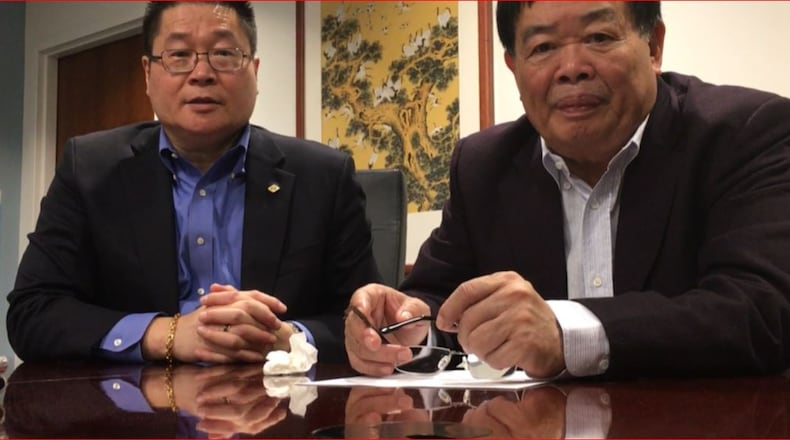“We did a lot of good things for that period of time,” Cho said via Jeff Liu, the president and chief executive of Fuyao Glass America, who acted as interpreter in an exclusive interview with the Dayton Daily News Wednesday. “None of them are actually mentioned in that movie. In his opinion, maybe the negative things were more eye-catching.”
MORE: Fuyao to honor Reichert, Bognar, 'American Factory' Oscar winners
Cho Tak Wong is the Chinese industrialist billionaire who built Fuyao Glass America in the shell of a former Moraine General Motors plant, creating what the company says today is the world’s largest auto glass production plant, with well over 2,300 employees.
Yellow Springs-based filmmakers Julia Reichert and Steven Bognar, and their colleagues, were the creative force behind “American Factory,” the widely acclaimed film exploring the painstaking creation of that plant. The work has been praised by everyone from former President Barack Obama, Harvard Business School professors and independent reviewers.
“Even though this ‘American Factory’ film is about Fuyao, truly it is an American story,” said the chairman, adding through Liu: “The directors are American. So the chairman respects their idea and how they filmed — that’s their call.”
“This is not a criticism of the movie, which the chairman respects,” Liu also said. “We’re not going to criticize — we’re going to learn from that.”
MORE: Defense secretary: No need to duplicate NASIC
Bognar and Reichert, in a phone interview Wednesday, said they believe the film showed plenty that was positive. They pointed to the portrayal of friendships formed between American and Chinese workers in the film, and the focus on one worker in particular who was able to move out of a relative’s basement into an apartment of her own, thanks to a job at Fuyao.
Reichert said the film could have shown 20 such instances of workers enjoying their own rising standard of living. “One person represents many people,” she said.
“We really tried hard to make a film that had a lot of nuance and raised questions,” Bognar said.
Both filmmakers had high praise for the chairman.
“If the chairman had not said ‘Yes’ to us, none of this would have ever happened,” Reichert said. “That’s why we have this documentary that’s being seen by millions of people around the world.”
Added Bognar: “We are grateful to the chairman, because he could have kicked us out of that factory at any point. But he never flinched. He’s a very thoughtful and complicated guy, and he should speak his mind about the film. We want him to do that.”
Reichert believes the film raises basic questions about what the American dream is today, about what a living wage is and should be.
Overall, she said, it’s positive for the Dayton region that Fuyao built its factory in Moraine.
“I like the guy,” Reichert added, referring to the chairman.
At one point in “American Factory,” Liu is seen in a meeting with Cho, telling him — via subtitled translations — that supporters of a United Auto Workers unionization effort at the plant had been fired.
Cho and Liu said Wednesday, however, that workers in fact were fired for legitimate reasons on grounds other than the failed unionization bid at the factory.
“Obviously, there were some bad apples on the floor,” Liu and Cho said. “Some people took drugs … we dealt with that, for sure, because that was what was best for the company.”
“We really did not (take) aim at anybody, to fire them,” they added. Union support “had nothing to do with it. We want to do what’s best for the company. That’s why we’re doing very well (today), because we actually are doing the best for the company.”
Last year, Fuyao Glass America agreed to pay nearly $120,000 total to a trio of employees in a National Labor Relations Board settlement that resolved charges that the company terminated the workers for supporting the union.
Federal documents obtained by the Dayton Daily News through the Freedom of Information Act last August show Fuyao reached the agreement with the federal government and three workers who said they were fired or disciplined because they supported a United Auto Workers campaign in 2016-17 to create a union at Fuyao's plant. (Workers voted down the unionization effort in November 2017.)
Fuyao has long denied that it terminated any workers for supporting union-organizing activities. And last year, Liu said the translation offered in the film — in which he says union supporters were fired — was “misleading.”
“We stand by that translation,” Bognar said Wednesday.
Liu and Cho point to their experience with the United Steelworkers at a floating glass plant in Mount Zion, Ill. — a plant which supplies Fuyao in Moraine — as evidence that the company can work with a union.
“It’s case by case,” Liu said.
Looking forward, Cho and Liu said Fuyao will continue to invest in the local plant. The company has spent some $600 million on plants here and in Illinois.
The Moraine plant is profitable, they said.
“We have to make it profitable, and then we’ll have the ability to continue to invest,” the executives said. “We will continue to grow, and we will continue to invest. There’s no question.”
About the Author

